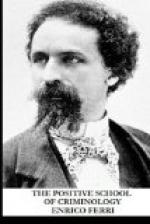It is a noble mission to oppose the ferocious penalties of the Middle Ages. But it is still nobler to forestall crime. The classic school of criminology directed its attention merely to penalties, to repressive measures after crime had been committed, with all its terrible moral and material consequences. For in the classic school, the remedies against criminality have not the social aim of improving human life, but merely the illusory mission of retributive justice, meeting a moral delinquency by a corresponding punishment in the shape of legal sentences. This is the spirit which is still pervading criminal legislation, although there is a sort of eclectic compromise between the old and the new. The classic school of criminology has substituted for the old absolutist conceptions of justice the eclectic theory that absolute justice has the right to punish, but a right modified by the interests of civilized life in present society. This is the point discussed in Italy in the celebrated controversy between Pasquale Stanislao Mancini and Terencio Mamiani, in 1847. This is in substance the theory followed by the classic criminologists who revised the penal code, which public opinion considers incapable of protecting society against the dangers of crime. And we have but to look about us in the realities of contemporaneous life in order to see that the criminal code is far from being a remedy against crime, that it remedies nothing, because either premeditation or passion in the person of the criminal deprive the criminal law of all prohibitory power. The deceptive faith in the efficacy of criminal law still lives in the public mind, because every normal man feels that the thought of imprisonment would stand in his way, if he contemplated tomorrow committing a theft, a rape, or a murder. He feels the bridle of the social sense. And the criminal code lends more strength to it and holds him back from criminal actions. But even if the criminal code did not exist, he would not commit a crime, so long as his physical and social environment would not urge him




